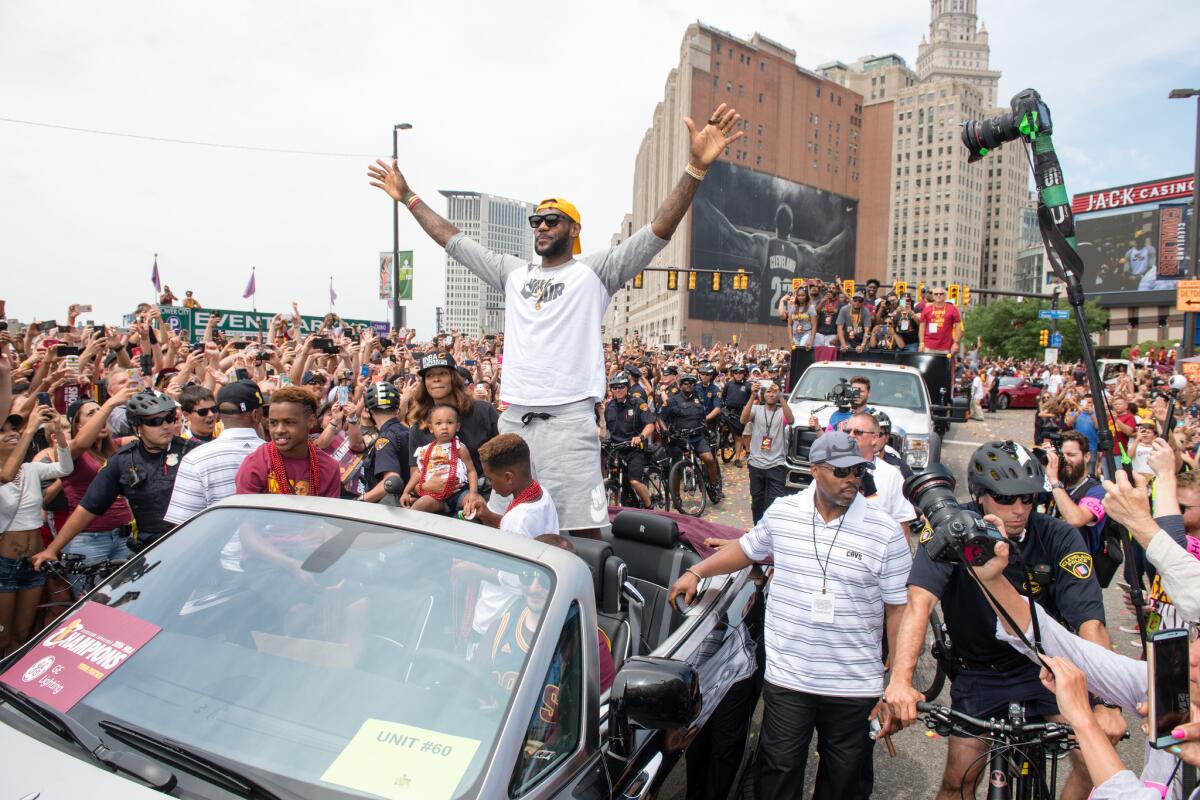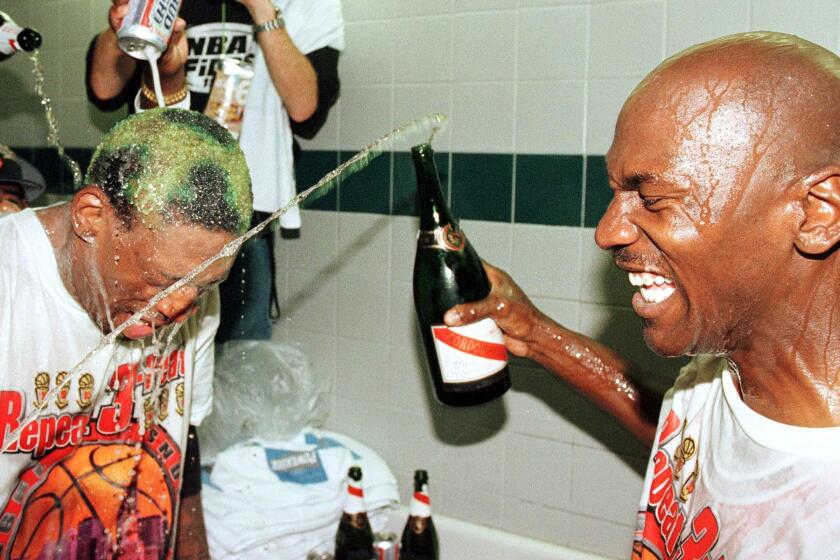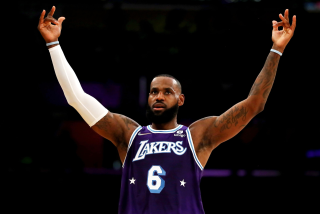Column: Is ESPN’s Michael Jordan docuseries a response to LeBron James?

When ESPN’s Ramona Shelburne reported this past weekend that Michael Jordan green-lit “The Last Dance” the day Cleveland staged its 2016 championship parade for LeBron James and the Cavaliers, I immediately thought of the great Aretha Franklin.
For most of her life, Franklin was known affectionately as “the Queen of Soul.” But uneasy lay her head that wore the crown. She had rivals — real and perceived — and she famously had ways of clearly marking her place, and theirs, in the music hierarchy. Perhaps Franklin’s most scathing expression of her ire was her 1968 cover of Dionne Warwick’s 1967 hit “I Say a Little Prayer.” Adding insult to injury, Franklin recruited Warwick’s aunt, Cissy Houston, to sing backup on her rendition.
Savage.
Jordan retired in 1999 as the consensus Greatest of All Time. However, after James slayed the greatest regular-season team of all time, the 73-9 Warriors, many pebbleheads reopened the individual debate. Jordan was learning what Franklin already knew — there was a legacy to be defended. In another generation, it wouldn’t be hard imagining a world where Jordan the Shoe was more recognized than Jordan the GOAT.
‘The Last Dance,’ which debuts Sunday, might shock some fans with its unfiltered behind-the-scenes look at Michael Jordan and the Chicago Bulls.
“It’s important to familiarize people,” said Donald Dell, founder of ProServ, the first sports marketing agency to hire Jordan. “From the very beginning, Michael understood his value and the value of his name.
“One day he came to me and said, ‘I want to leave Coca-Cola because they’re not using me.’ We had a four-year deal, but for the first three years they didn’t do anything with him. They didn’t properly promote him, and we got them to let us out a year early to go with Gatorade. We negotiated the deal, but it was Michael who initiated it all ... he knew his worth.”
So did Jordan give his blessing to the 10-part documentary — after keeping the hours of raw footage tucked away in storage for many years — because he felt threatened?
Dell negotiated Jordan’s first two contracts with Nike but lost him as a client after his ProServ colleague David Falk left the agency in 1992. He hasn’t spent time with Jordan in 25 years, but he has some interesting thoughts on the subject.
“He is instinctively far more competitive than you would ever understand,” Dell said. “He always looked for something to beat you at. He loves the excitement of competing and is so passionate about sports. When he was playing, he wasn’t a big, brash talker. He didn’t say things like, ‘I’m the best, give me the ball,’ but he certainly believed it.”

As its name suggests, ProServ started off representing tennis players. In fact, Dell, a former Davis Cup captain and member of the International Tennis Hall of Fame, was ranked as high as No. 5 in the world. When he got his start, his first two clients were Arthur Ashe and Stan Smith, whose signature shoe with Adidas is every bit as iconic as Jordan’s.
“Stan and Michael are in two different places,” said Dell, who still represents the 73-year-old Smith. “Stan was a great player and he had a fantastic career, but when he retired he was not considered the greatest of all time. So for him to be known more today for his shoes than as a player is understandable. Obviously, that’s not the case with Michael. He was the bigger star and he had accomplished far more in his career. That should not be forgotten.”
Like the way a generation has forgotten Kareem Abdul-Jabbar was once the GOAT.
The way Pete Sampras, who also was a client of Dell’s, was the now-forgotten GOAT when he said goodbye.
Michael Jordan timeline: A look at the Hall of Famer’s career.
Before the 2016 NBA Finals, basketball fans were beginning to question whether two-time MVP Steph Curry had replaced James as the game’s best. That line of thinking was laid to rest after the Cavaliers won and James’ place in league folklore was elevated. Perhaps a little too highly for Jordan’s comfort, hence the “Last Dance,” his version of Aretha Franklin’s 1968 cover.
“Michael Jordan is where he’s at because he was so damn good,” Dell said. “When he walked into a room, he was always smiling and his personality carried the day. That’s not a small thing. I’ve managed and represented great athletes for a very long time, and let me tell you something — character matters. It’s the common denominator of any great team and any great player. I used to always say that about great tennis players ... when things aren’t going right, if you’re not serving well or moving well, your character comes out. That’s the difference between the good and the greats.
“Michael was great. Young people need to see that. ... I think it’s very smart of him and Nike and everyone involved to remind the next generation he’s more than his shoes.”
More to Read
Go beyond the scoreboard
Get the latest on L.A.'s teams in the daily Sports Report newsletter.
You may occasionally receive promotional content from the Los Angeles Times.












